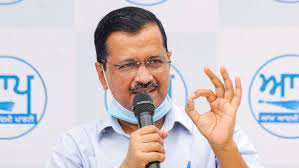Delhi Court Grants Exemption to Arvind Kejriwal in Defamation Case, Orders Appearance on February 29

The case stems from a video that Kejriwal shared on May 7, 2018, without verifying the allegations' authenticity
A Delhi Court on Wednesday granted exemption to Delhi Chief Minister Arvind Kejriwal from personal appearance for the day in a criminal defamation case.
The case pertains to the retweeting of an allegedly defamatory video circulated by YouTuber Dhruv Rathee in May 2018.
Additional Chief Metropolitan Magistrate (ACMM) Tanya Bamniyal of Rouse Avenue Court acceded to the exemption plea filed by Kejriwal's counsel, directing him to appear before the court on February 29.
The plea cited Kejriwal's engagements in "budget sessions" as the reason for seeking exemption from personal appearance.
This decision follows the High Court's ruling on February 5, which upheld the summons issued to Kejriwal by the trial court as an accused. Justice Swarana Kanta Sharma had underscored the need for responsibility when retweeting content, emphasizing that reposting alleged libelous material falls under defamation.
The high court's verdict highlighted the potential legal consequences of retweeting defamatory content without attaching a disclaimer, emphasizing that such actions could invite penal, civil, and tort action.
The high court had rejected Kejriwal's plea, emphasizing that Kejriwal, with a significant Twitter following, understood the implications of retweeting the video.
"While the petitioner may plead absence of any malicious intent in the act of retweeting, the Court has to consider the responsibility that accompanies the petitioner's political and social standing. Needless to say, the large social media following of a Chief Minister of a State undoubtedly implies a wider reach, making any retweet a form of public endorsement or acknowledgment," the court had said.
The judge had opined that the online interactions and engagement on Twitter, which involve the publication of defamatory statements and content and sharing such content with others by retweeting, will surely attract liability since it would amount to posting defamatory content as one's own by believing it to be true and thus sharing it with the public at large.
Kejriwal had contended that his tweet was not intended to harm complainant Vikas Sankrityayan. The plea also criticized the trial court for allegedly issuing summons without providing reasons and without a judicial application of mind.
Complainant Sankrityayan had alleged that the YouTube video titled 'BJP IT Cell Part II,' circulated by Rathee from Germany, contained false and defamatory allegations.
Case Title: Vikas Sankrityayan @ Vikas Pandey v. Arvind Kejriwal
